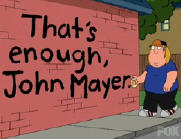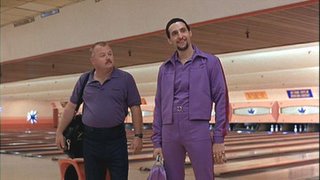Following Bush's speech the other night, I read a lot of liberal commentators go on and on about how his arguments were "straw man. Sorry for not linking to them now, but go to
Instaupundit, follow his links and you'll find a few (a permalink to his commentary on the speech is a few posts down).
I typically have a problem whenever someone calls
straw man on an opposing argument. The problem is that it's usually a way to ignore an opposing point of view based on what someone learned to be a logical fallacy in a college debate class. Yeah, I took the class. I needed the credits. Either way, what results is ignoring the opportunity for discourse simply because one party didn't like
how the other party made his or her point. But when we do that, we lose the opportunity to get beyond the fallacy and truly discuss the point of contention.
Tonight I ran across
this blog post from Scott Feldstein where he calmly expresses his distaste for those who believe one of the biggest problems facing our nation are "freeloaders," or those people who "get more out of the system than they put in[.]" To be fair, the point of his post is not so much that this isn't a problem as it isn't our nations biggest problem. But within his argument is the dreaded, to high-school debate coaches and myself alike (albeit for different reasons),
straw man argument.
"How is it that they honestly believe that of all the problems facing our nation
the one that requires the most urgent action is that some poor person might be
getting more out the system than they put in?"
First off, I want to point out why this is a straw man argument. You see, Scott, the problem isn't that "some poor person" is getting more than his or her fair share, it's that multitudes of poor people are getting more than
their fair share. I honestly don't believe that any sane person would have a problem with this if the case were that a fraction of a fraction of a fraction of our population fit this description. The issue is that there a millions of people filling this role, and
that is why so many feel it's an issue requiring "urgent action."
(Now that I've regretfully had to point out the straw man aspect of the argument, I'd like to move on to the actual discourse.)
"Being on the dole" has become an institutionalized way of life in this country. Knowing how to get as much assistance out of government with the least amount of work, for some, is almost an occupation these days. If you don't believe that, consider all those unwilling to get jobs for fear of losing the welfare, foodstamps and unemployment our government provides. That, Scott, is the "disincentivising hard work" you oppose as much as those with whom you disagree.
I will be one of the first to argue that there are certainly those in need of society's assistance. But when able-bodied individuals see such assistance as an option, not a last resort, it really does become one of the greatest issues facing this nation. It isn't just a matter of spending our tax dollars on these people, it's a matter of nurturing a belief that government is responsible for taking care of you. The cascading effect of such a belief, from the person collecting assistance to the politician advocating it, is so detrimental to the overall success of our nation that it cannot be ignored. Every penny spent on a person who believes he or she should take advantage of the opportunities afforded them by government and not those inherently afforded them as human beings with potential is a penny not spent on education, roads or national defense. The societal effort to make a poor person less poor even though it's within their own power to do so just makes everyone else poor in the process.
And there's the discourse.

































